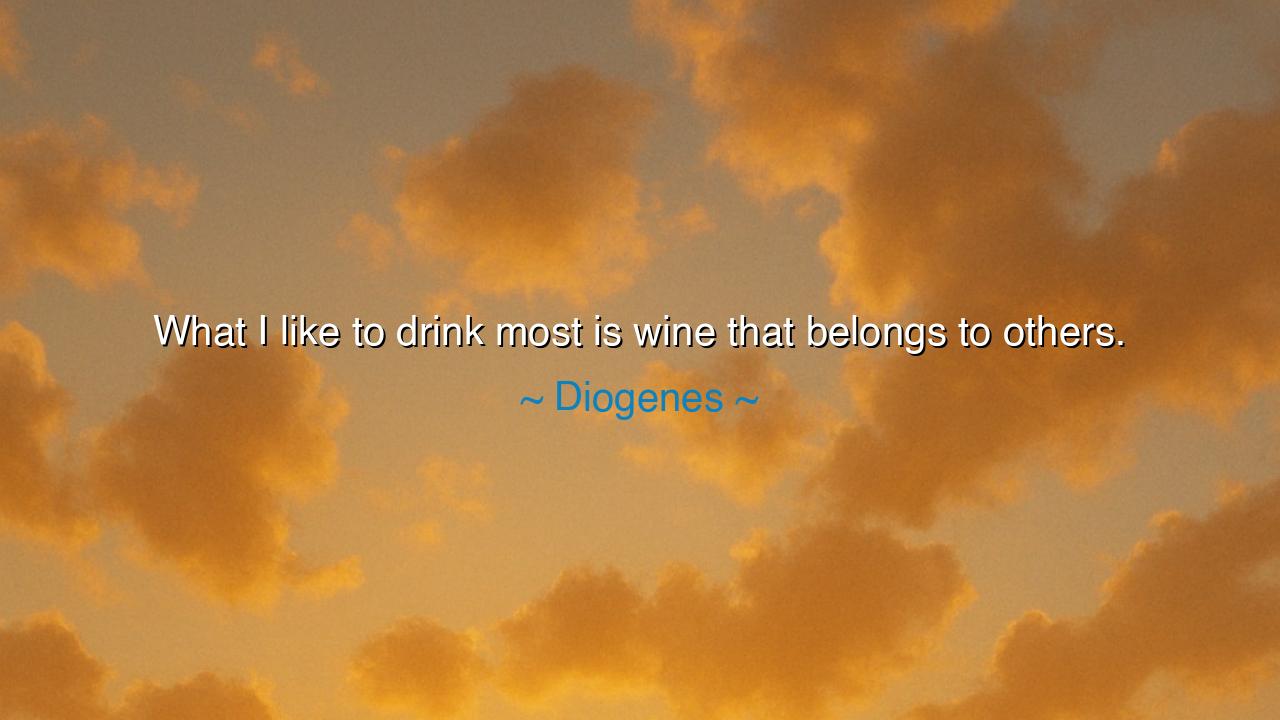
What I like to drink most is wine that belongs to others.






When the philosopher Diogenes of Sinope jested, “What I like to drink most is wine that belongs to others,” he cloaked sharp wisdom in playful words. Known as the great Cynic, he delighted in paradox and provocation, using wit to strip bare the pretenses of society. On the surface, this saying appears as mere humor, a mischievous delight in drinking what one has not paid for. Yet beneath it lies a deeper lesson about desire, simplicity, and freedom—the philosophy that true joy does not come from possession, but from learning to partake without being enslaved by ownership.
The origin of these words lies in Diogenes’ larger way of life. He rejected the trappings of wealth, comfort, and convention, choosing instead to live with radical simplicity. Dwelling in a barrel, clothed in rags, he mocked the vanity of kings and philosophers alike. By proclaiming his love for the wine of others, he was not merely confessing mischief, but highlighting his indifference to property and his delight in life’s pleasures without burden. To drink another’s wine was not greed to him—it was proof that he had freed himself from the chains of acquisition, enjoying what came without the weight of ownership.
History tells us that Diogenes often used such humor to humble the mighty. When Alexander the Great sought him out and offered him anything he desired, Diogenes famously replied, “Stand out of my sunlight.” In this spirit, his remark about wine is not about theft or idleness, but about contentment. The Cynic believed that possessions enslave, but freedom is found when one can laugh, live lightly, and rejoice in what life places before them—even if it belongs to another. His words cut through the seriousness of wealth and remind us that joy is richer than ownership.
We may see echoes of this truth in later times. Consider the wandering poets of medieval Europe, the troubadours and minstrels, who often lived with little, yet were welcomed into courts and villages. They sang, they laughed, they drank, often at the tables of others, yet their wealth was in freedom, not in gold. Their joy did not come from what they owned, but from the experiences they shared, the generosity of others, and the lightness of carrying little. Like Diogenes, they understood that to depend less on possessions was to depend more on the abundance of life itself.
The lesson of this saying is not to take what is not yours, but to remember that true contentment does not lie in accumulation. One who always needs to own in order to enjoy is forever burdened, forever anxious. But one who can laugh, partake, and be grateful for what comes—whether from their own hand or another’s—walks in freedom. Diogenes reminds us that the happiest soul is not the richest one, but the one least enslaved by the need for ownership.
Practical wisdom flows from this: live simply, do not chase every possession, and learn to find joy in sharing. Be willing to receive with gratitude, and equally, to give generously, so that others may delight in the “wine” of your own table. In this exchange, community is built, and freedom from greed is found. By embracing lightness of heart, we loosen the grip of material things and rediscover the sweetness of simple pleasures.
Thus, let us remember the old philosopher’s playful words: “the best wine is that which belongs to others.” It is not the wine itself, but the spirit of freedom, laughter, and humility that makes it sweetest. Children of tomorrow, learn from this ancient jest: do not be weighed down by possessions, but find delight in the gifts of the moment, whether they come from your hand or another’s. For life’s truest feast is not in what you own, but in how joyfully you partake.






AAdministratorAdministrator
Welcome, honored guests. Please leave a comment, we will respond soon